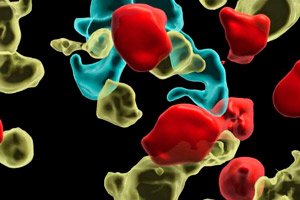
All iLive content is medically reviewed or fact checked to ensure as much factual accuracy as possible.
We have strict sourcing guidelines and only link to reputable media sites, academic research institutions and, whenever possible, medically peer reviewed studies. Note that the numbers in parentheses ([1], [2], etc.) are clickable links to these studies.
If you feel that any of our content is inaccurate, out-of-date, or otherwise questionable, please select it and press Ctrl + Enter.
A turning point in cancer treatment: monocytes boost T cells in immunotherapy
Last reviewed: 03.07.2025
 ">
">Immunotherapy has been revolutionizing cancer treatment for decades, providing patients with serious diseases such as melanoma, lung and bladder cancer with new and effective treatments. However, significant hurdles remain, particularly due to the ability of cancer cells to evade the immune response. A new study published in the journal Nature has found that monocytes, a previously under-appreciated type of immune cell, play a critical role in reactivating T cells to help fight tumors.
The immune system and cancer
Immunotherapy activates the immune system to kill cancer cells. Central to this process are T cells, which require activation by antigen-presenting cells (APCs) such as dendritic cells. However, researchers have found that to effectively fight tumors, T cells require additional activation once they reach the tumor microenvironment.
Discovery of the role of monocytes
A team led by Anne Obenauf from the Institute of Molecular Pathology (IMP) studied the tumor microenvironment in mouse models of melanoma. They found that immunotherapy-sensitive tumors had a high number of monocytes, in contrast to resistant tumors, where suppressive macrophages dominated.
The monocytes were able to "take over" parts of cancer cells and present them to T cells, enhancing their ability to recognize and destroy the tumor. This process, called "cross-dressing," was critical for activating T cells within the tumor itself.
How Cancer Suppresses the Immune Response
The study also revealed how cancer cells evade the immune response: They increase production of the molecule prostaglandin E2 (PGE2), which blocks the action of monocytes and dendritic cells, while simultaneously reducing levels of interferons, which stimulate immune activity.
New approaches to treatment
The researchers propose using COX inhibitors such as aspirin to block PGE2 production, as well as methods to boost interferon production. These strategies could be combined with existing immunotherapies, opening up new avenues for treating treatment-resistant cancers including melanoma, lung, pancreatic, and colorectal cancer.
Research Prospects
“We have already identified strategies that can improve the effectiveness of immunotherapy,” says Anna Obenauf. The next step will be clinical trials of the combined use of COX inhibitors and immunotherapy.
This study reveals new mechanisms of antitumor immunity that could significantly expand the availability of immunotherapy to more patients facing severe forms of cancer.
The study was published in the journal Nature.
